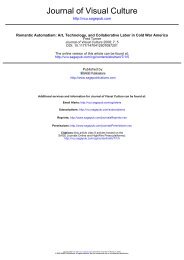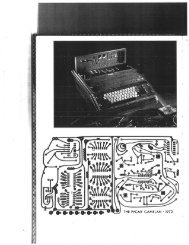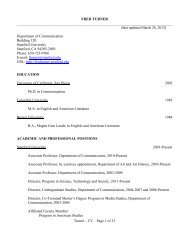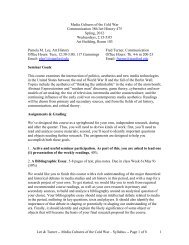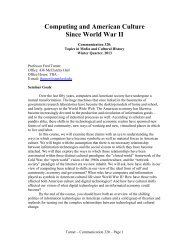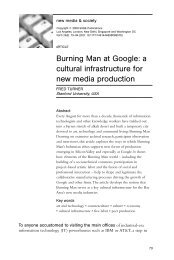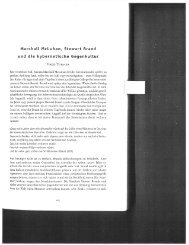The Family of Man and the Politics of Attention in ... - Public Culture
The Family of Man and the Politics of Attention in ... - Public Culture
The Family of Man and the Politics of Attention in ... - Public Culture
Create successful ePaper yourself
Turn your PDF publications into a flip-book with our unique Google optimized e-Paper software.
<strong>Public</strong> <strong>Culture</strong><br />
analysts <strong>and</strong> policy makers asked, could an American society riven by racism <strong>and</strong><br />
class dist<strong>in</strong>ctions achieve <strong>the</strong> unity it would need to defeat <strong>the</strong> fascist states? Propag<strong>and</strong>a<br />
would undoubtedly be part <strong>of</strong> <strong>the</strong> answer, but if it was, how could Americans<br />
use media <strong>in</strong> a way that would not produce <strong>the</strong> atomiz<strong>in</strong>g psychological effects<br />
seen <strong>in</strong> Germany <strong>and</strong> elsewhere? As Horkheimer would later put it, “Democracy<br />
[cannot] hope to emulate totalitarian propag<strong>and</strong>a, unless it undertakes to compromise<br />
<strong>the</strong> democratic way <strong>of</strong> life by stimulat<strong>in</strong>g destructive unconscious forces.” 17<br />
How, <strong>the</strong>n, could <strong>the</strong> United States create media that would promote democratic<br />
unity without implant<strong>in</strong>g a totalitarian m<strong>in</strong>d- set <strong>in</strong> American citizens?<br />
<strong>The</strong> answer to this question would substantially shape <strong>the</strong> design <strong>of</strong> <strong>The</strong> <strong>Family</strong><br />
<strong>of</strong> <strong>Man</strong>. To see how, we need to return to <strong>the</strong> summer <strong>of</strong> 1940, when Brita<strong>in</strong><br />
<strong>and</strong> France were already at war with Germany <strong>and</strong> many Americans feared <strong>the</strong>y<br />
would soon jo<strong>in</strong> <strong>the</strong>m. In those months, <strong>Man</strong>hattan became a center for reimag<strong>in</strong><strong>in</strong>g<br />
American media, especially <strong>in</strong> relationship to <strong>the</strong> <strong>in</strong>dividual personality<br />
<strong>and</strong> to <strong>the</strong> ideal <strong>of</strong> democratic morale. At <strong>the</strong> center <strong>of</strong> this work was a longforgotten<br />
collection <strong>of</strong> <strong>the</strong> era’s lead<strong>in</strong>g psychologists, sociologists, <strong>and</strong> journalists,<br />
called <strong>the</strong> Committee for National Morale. Founded by Arthur Upham<br />
Pope, a <strong>Man</strong>hattan- based curator <strong>of</strong> Persian art, <strong>the</strong> committee <strong>in</strong>cluded journalists<br />
Edmond Taylor <strong>and</strong> Ladislas Farago, psychologists Gordon W. Allport <strong>and</strong><br />
Kurt Lew<strong>in</strong>, <strong>and</strong> anthropologists Ruth Benedict, Gregory Bateson, <strong>and</strong> Margaret<br />
Mead, among more than sixty o<strong>the</strong>r affiliates. Members <strong>of</strong> <strong>the</strong> committee <strong>of</strong>fered<br />
advice to President Frankl<strong>in</strong> D. Roosevelt <strong>and</strong> his cab<strong>in</strong>et, published widely read<br />
reports on German propag<strong>and</strong>a <strong>and</strong> strategy, <strong>and</strong> wrote extensively on morale, for<br />
both <strong>the</strong> popular <strong>and</strong> <strong>the</strong> pr<strong>of</strong>essional press.<br />
<strong>The</strong> committee paid particular attention to dist<strong>in</strong>guish<strong>in</strong>g fascist from democratic<br />
morale. In his 1941 committee- sponsored study German Psychological<br />
Warfare, for example, Farago po<strong>in</strong>ted out that many Americans believed that “<strong>the</strong><br />
German is a robot.” In fact, he expla<strong>in</strong>ed, “<strong>the</strong> Nazis <strong>in</strong>tend him to be exactly<br />
that <strong>in</strong> <strong>the</strong> mass- psychological sense.” 18 Committee members largely agreed that<br />
totalitarian propag<strong>and</strong>a worked to divide <strong>the</strong> emotions from reason. It amplified<br />
<strong>the</strong> emotions <strong>and</strong> muted <strong>the</strong> voice <strong>of</strong> logic. <strong>The</strong> fascist citizen thus became a fractured<br />
person, blown hi<strong>the</strong>r <strong>and</strong> thi<strong>the</strong>r by <strong>the</strong> voice <strong>of</strong> <strong>the</strong> Führer, on <strong>the</strong> w<strong>in</strong>ds <strong>of</strong><br />
feel<strong>in</strong>g alone. Intelligence <strong>and</strong> will were decoupled, <strong>and</strong> <strong>the</strong> self was crippled, as<br />
a person <strong>and</strong> as a citizen.<br />
17. Horkheimer, Eclipse <strong>of</strong> Reason, 82.<br />
18. Ladislas Farago, Lewis Frederick Gittler, Kimball Young, <strong>and</strong> Committee for National<br />
Morale, German Psychological Warfare (New York: Committee for National Morale, 1941), 51.<br />
64



